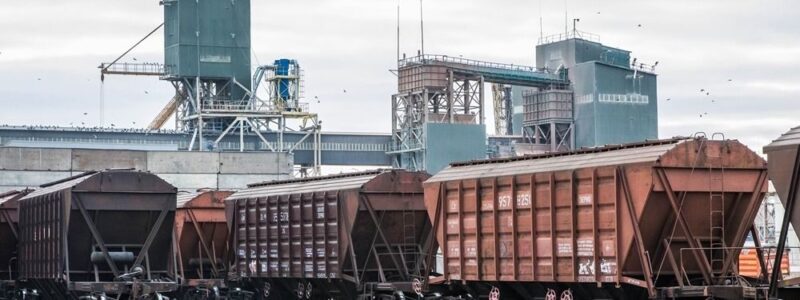
During the last week, the daily volume of grain export by rail decreased by 2-3 thousand tons per day on average – down to 108 thousand tons per day because of artificial delays in the registration of vessels by Russian representatives in inspection groups under the Joint Coordination Center in Istanbul and reducing the effectiveness of the “grain corridor”, said Valery Tkachev, Deputy Director of the department of commercial work UZ at a meeting with market participants on Thursday.
“If we compare the current daily average with a week ago, we can state a slight decrease in the average daily volume of grain transportation in the export direction: today we carry an average of 108 thousand tons per day, while a week ago – 110 thousand tons, mainly due to lower traffic volumes to sea ports,” – said Tkachev.
At the same time, he said, the volume of grain transportation in the direction of overland railroad crossings has increased on average by 1 thousand tons per day – up to almost 34 thousand tons per day.
In February (February 22) UZ already transported 2.37 million tons of grain for export.
Earlier Yuri Vaskov, deputy minister of reconstruction, said on Aljazeera English live broadcast that since October the efficiency of the “grain corridor” does not exceed 40% of the available export capacities.
On February 15, Ukraine issued a statement calling on the international community, particularly the United Nations and Turkey, as guarantors of the Black Sea Grain Initiative, to demand that Russia immediately stop its artificial delays and unblock commercial shipping to Ukrainian Black Sea ports.
The Ukrainian side notes that Russian representatives in the inspection teams under the Joint Coordination Centre in Istanbul have been systematically delaying for several months in a row the inspection of vessels transiting the Bosporus Strait to/from Ukrainian ports. Every day less than half of the planned 10 inspections usually take place. As a result, in the last three months alone the world was short 10 million tons of Ukrainian food, and the queue of ships waiting for inspection in the Bosporus exceeded 140 units.
Representatives of Ukraine noted that at the same time, Russia enjoys the opportunity of unimpeded commercial shipping from Russian Black Sea ports: the volume of traffic through Russian seaports in the Azov-Black Sea basin in 2022 was more than 250 million tons, which exceeded the figures in 2021.